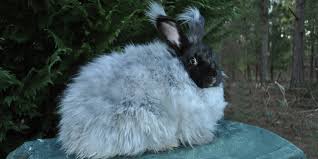
German Angora
Conditions of detention
German Angoras need a spacious, well-ventilated hutch or cage with plenty of room to move and a clean, dry area for resting.
Useful Fact: Due to their thick wool, they should be kept in cooler environments to prevent overheating.
Nutrition and diet
A diet of high-quality hay, fresh vegetables, and a controlled amount of pellets is essential. Regular access to fresh water is also necessary.
Useful Fact: Feeding them wool block preventatives, like papaya tablets, can help reduce the risk of wool block (a digestive issue) due to ingesting their own fur.
Health
German Angoras are generally healthy but require regular shearing to prevent matting and overheating. They can also be prone to wool block.
Useful Fact: Regularly check their fur for matting and skin irritation, especially around the neck and under the legs.
Grooming and care
They require frequent grooming, ideally daily, to manage their long, thick wool. Shearing should be done every 90 days.
Useful Fact: Keeping their fur well-trimmed helps prevent overheating and reduces the risk of wool block.
Education and training
They can be litter trained with patience and consistency, although their wool may get caught in the litter.
Useful Fact: Use a litter made from paper or wood pellets, which is less likely to stick to their wool.
Toys and entertainment
German Angoras enjoy chew toys, tunnels, and objects that stimulate their natural instincts.
Useful Fact: Rotate toys regularly to keep them engaged and prevent boredom.
Safety
Ensure their environment is free from sharp objects that could snag or damage their wool.
Useful Fact: Regularly inspect their hutch or cage for any potential hazards to their fur.
Accessories
Essential accessories include a large litter box, sturdy food dish, water bottle, and a grooming kit for regular maintenance.
Useful Fact: A soft, wool-friendly mat or bedding is recommended to prevent wool from matting or tangling.
Socialization
German Angoras are social rabbits that enjoy human interaction and the company of other rabbits.
Useful Fact: Regular grooming sessions can also serve as bonding time, helping to strengthen the relationship between rabbit and owner.
Travel and Transportation
Use a secure, well-ventilated carrier with ample space for the rabbit’s wool.
Useful Fact: Lining the carrier with a soft towel can help prevent their wool from getting tangled or dirty during travel.
Behavior and psychology
German Angoras are known for their calm and gentle nature. They enjoy being handled, especially if they are used to regular grooming.
Useful Fact: These rabbits can be quite docile, making them excellent companions for experienced rabbit owners.
Legal aspects
There are generally no specific legal restrictions on owning German Angoras, but it’s always good to check local regulations.
Useful Fact: If you plan to sell or use their wool commercially, be aware of any local regulations regarding agricultural products.


